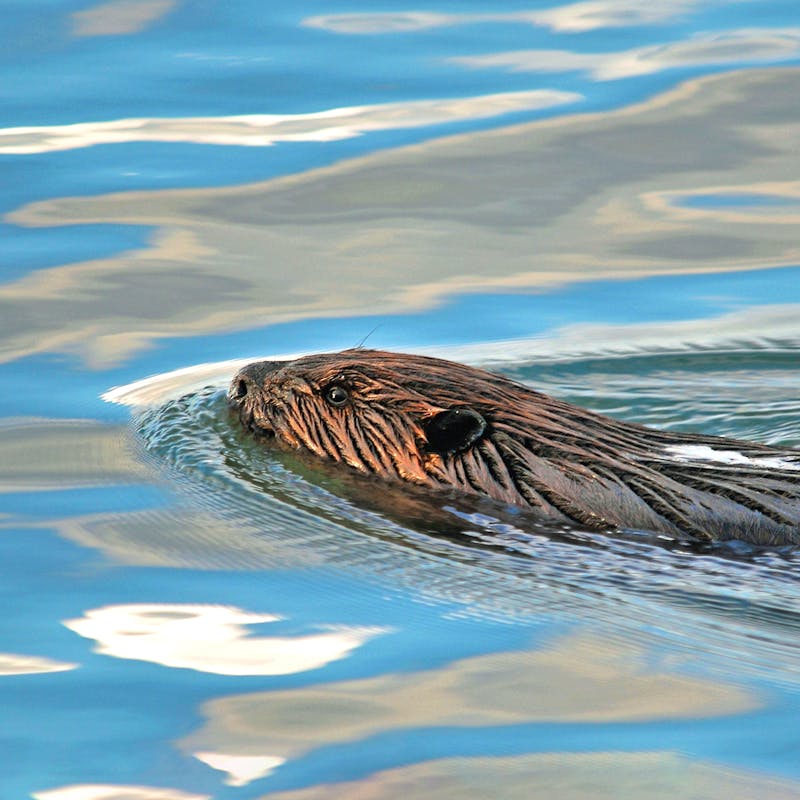Conservation groups filed a petition today asking the Oregon Fish and Wildlife Commission to permanently close commercial and recreational beaver trapping and hunting on the state’s federally managed public lands and the waters that flow through them. Beavers are Oregon’s official state animal, but they can be legally hunted and trapped with few limits.
Cascadia Wildlands, the Center for Biological Diversity, the Conservation Angler, Defenders of Wildlife, Northeast Oregon Ecosystems, Umpqua Watersheds, WaterWatch of Oregon and Wetlands Conservancy filed this petition along with Suzanne Fouty, a retired hydrologist with the U.S. Forest Service.
The Oregon Fish and Wildlife Commission discussed this request in June as part of its review of the state’s furbearer regulations. But it was rejected then as being outside the scope of that rulemaking notice. Today’s petition initiates a new rulemaking process for the commission’s consideration.
“Federal and state agencies, watershed councils, utility companies, conservation groups, and private landowners spend countless hours and millions of dollars every year to restore Oregon’s waterways, mimicking the natural behavior of beavers,” said Nick Cady, legal director of Cascadia Wildlands. “At the same time, Oregon’s Department of Fish and Wildlife permits limitless commercial and recreational trapping of beavers and does not even monitor populations. The department’s beaver trapping and hunting regulations are outdated and directly undermine the extensive, ongoing restoration of our water resources and efforts to recover imperiled salmon populations.”
Beavers are a keystone species and offer widely recognized ecological, economic, and social benefits, today’s petition notes. Beaver-created and maintained habitat improves water quality, decreases the impacts of floods, and restores natural water flows. This benefits humans and a wide variety of fish and wildlife, including highly endangered coho salmon. Beavers therefore play an important role in improving Oregon’s water security and minimizing impacts of climate change on human and wild communities.
“Beavers are our natural allies in the fight against climate change,” said Quinn Read, Oregon policy director at the Center for Biological Diversity. “We live in the Beaver State, and it’s appalling that beavers are still hunted and trapped. This cruel practice favors a few people and deprives other Oregonians and endangered salmon of the benefits of beaver-created habitat.”
Few people in Oregon trap or hunt beavers. But today’s petition points out that the annual culling of the species has significant negative effects on beaver populations and their corresponding social, economic and ecological benefits. The petition’s requested changes wouldn’t affect hunting and trapping opportunities elsewhere but they would allow beavers to thrive on federally managed public lands.
“Many people don’t know just how critical beavers are to functioning watersheds that, in turn, benefit hundreds of other plants and animals, including threatened and endangered species,” said Sristi Kamal, senior northwest representative for Defenders of Wildlife. “Beaver conservation on federal lands could be key to the conservation success of such species and their ability to survive and adapt to climate change impacts.”
Beaver populations have been significantly reduced from historic levels through hunting and trapping. These ongoing practices suppress population growth and expansion into large swaths of unoccupied suitable beaver habitat.
Cascadia Wildlands defends and restores Cascadia’s wild ecosystems in the forests, in the courts, and in the streets. We envision vast old-growth forests, rivers full of salmon, wolves howling in the backcountry, and vibrant communities sustained by the unique landscapes of the Cascadia bioregion.
The Center for Biological Diversity is a national, nonprofit conservation organization with more than 1.7 million members and online activists dedicated to the protection of endangered species and wild places.
Defenders of Wildlife is dedicated to the protection of all native animals and plants in their natural communities. With over 1.8 million members and activists, Defenders of Wildlife is a leading advocate for innovative solutions to safeguard our wildlife heritage for generations to come. For more information, visit defenders.org/newsroom and follow us on Twitter @Defenders.
For over 75 years, Defenders of Wildlife has remained dedicated to protecting all native animals and plants in their natural communities. With a nationwide network of nearly 2.1 million members and supporters, Defenders of Wildlife is a leading advocate for innovative solutions to safeguard our wildlife for generations to come. To learn more, please visit https://defenders.org/newsroom or follow us on X @Defenders.
Media Contact
News

Study Led by Defenders of Wildlife Scientist Shows Noise Pollution Impacts on Migratory Birds

